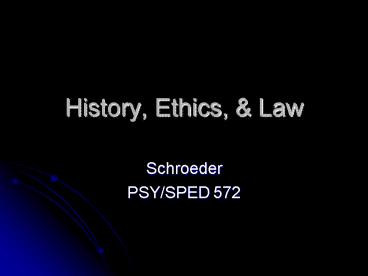History, Ethics, PowerPoint PPT Presentation
1 / 15
Title: History, Ethics,
1
History, Ethics, Law
- Schroeder
- PSY/SPED 572
2
History of Testing
- Used in ancient Greece and China
- Used to assess physical and intellectual skills
- Darwin individual differences
- Galton
- Wundt experimental psychology
- Cattell
3
History of Testing
- Classification of Individuals with Mentally
Retardation - For purposes of institutionalization
- Binet
- Wechsler
- Personality tests
- Spurred by wartime needs
4
Culture and Testing
- Socially transmitted behavior patterns, beliefs,
and products of work of a particular group of
people - Goddard
- Eells, Davis, Havighurst et al. (1951)
- Responses to IQ test items are influenced by
culture of respondent - Tests of IQ in the US should be selected from the
common culture only - In available IQ tests numerous items require
experience only part of higher SES (40 of
individuals) - Basic cultural flaws in all IQ tests can only be
overcome by selecting items from the common
culture
5
Culture and Testing
- Culture-specific tests
- Translation
- Meanings change
- Difficulty of items change
- Verbal communication
- Nonverbal communication and behavior
- Standards of evaluation
- Cultural relativity
6
Big Questions
- What are ethics?
- Why do we have rules about ethics?
- Who makes the rules for ethical behavior?
- How do ethics interact with the law?
7
Ethics
- Principles that guide our behavior
- Used to protect interests of those served
- Ethics put forth by profession
- APA Ethical Principles of Psychologists and Code
of Conduct (2002) - NASP Principles for Professional Ethics (2000)
- CEC Code of Ethics for Educators of Persons with
Exceptionalities (1983)
8
Ethics
- Problems with ethics
- Broad and abstract
- Competition among principles
- Reactive
- Use of ethics for the professional
- Guide for behavior
9
Broad Principles
- Respect for Person
- Professional Competence
- Integrity in Professional Relationships
- Responsibility to Community and Society
10
Unethical Conduct
- What happens to you?
- Who has the power to do something about it?
11
Professional Guidelines
- Standards for Educational and Psychological
Testing (AERA, APA, NCME, 1999) - Guidelines for Provision of School Psychological
Services (NASP, 2000a) - Guidelines for Providers of Psychological
Services to Ethnic, Cultural, and Linguistically
Diverse Populations (APA, 1993a) - Guidelines for Psychotherapy with Lesbian, Gay
and Bisexual Clients (APA, 2000) - Code of Ethics and Standard Practices for Texas
Educators (Texas State Board for Educator
Certification, 2002)
12
Informed Consent
- Three elements
- Knowing
- Competent
- Voluntary
- With minors right to consent is given to parents,
except - in emergency situations
- in some states for health issues (e.g., drug
abuse, STDs) - Minors and assent
- Use written agreements with students
- Increases treatment outcomes
- Do not seek if you will not honor refusal
- Still need to inform of services
- Cannot use blanket consent
- E.g., provide services as needed
13
Record Keeping
- Sole possession records (personal notes)
- Cannot share with anyone
- Can be subpoenaed
- Does not matter if kept separate
- Under FERPA parents have right to review records
of students over 18 if the student is a dependent
under federal tax law - Parents have legal right to inspect test
protocols - Do not have to copy unless sent directly to
individual qualified to interpret (must have
consent) - Can let parents view with supervision at school
- Parents cannot access test materials that are not
part of their childs performance record (e.g.,
test manuals, stimuli) - Keep records 5-10 years after child reaches age
of majority - Make sure others cannot retrieve files from old
or damaged computers - If emailing, strip of all info that identifies
student
14
Assessment
- Parent involvement consent
- Can ethically test student without assent if
assessment promises to benefit them - Assessment of a child must
- Multiple method, informant, setting
- Comprehensive
- Fair
- Acculturation
- Use technically adequate instruments
- Be done under good conditions
- Include interpretation focused on interventions
and recommendations
15
Professional Malpractice
- Harm is done to client
- Occurs within context of client-professional
relationship - Standard of care was breached (you did not do
what you should have) - Harm was foreseeable
- They always look to what other professionals
would have done

